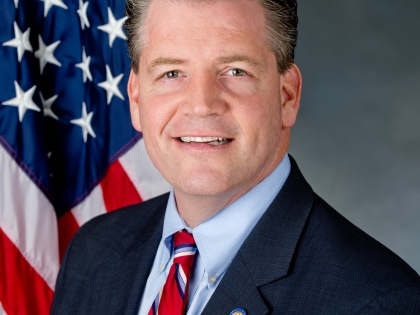
Murphy passes 'Enough is Enough' law to combat sexual assault on college campuses
Terrence P. Murphy
June 18, 2015
-
ISSUE:
- Crime
- Higher Education
- Victims
- Rape

ALBANY, NY - Yesterday the New York State Senate passed landmark legislation, advocated by Senator Terrence Murphy, to fight against sexual violence on college campuses by creating a uniform definition for affirmative consent. Supporters of the bill are applauding what they say is its comprehensive approach to help make every college and university campus throughout New York State more safe and secure.
"As a father of three kids I firmly believe we must take every precaution to protect our children from sexual violence and abuse," Senator Terrence Murphy said. "Earlier this year we passed milestone legislation to protect our children from sexual predators and yesterday's legislation aims to ensure our children at college are equally protected. I applaud the author, Senator Ken LaValle, for his commitment and continued work to ensure this important piece of legislation was passed."
Senate Majority Leader John Flanagan said, "Keeping our students safe is essential, and this bill succeeds in combating and rooting out sexual assualt so campuses remain safe learning environments. I thank Senator Ken LaValle for his work developing a comprehensive plan to protect all students, help victims, and provide resources that will enable colleges and universities to put an end to sexual violence on campus."
In 2014, the Senate Higher Education Committee convened a roundtable of advocates, legislators, college and university officials, and security personnel to examine sexual violence on college campuses. In October, the committee released a report, Sexual Violence on College Campuses; A New York State Perspective, that reviewed research, state and federal laws, and best practices and made recommendations for state legislative action, many of which are included in the bill passed today.
The Senators said the legislation was developed in concert with victim's rights advocates, law enforcement professionals, legal experts and higher education professionals. The law would help prevent sexual assaults and provide more support to victims by improving the ability of educational institutions to appropriately respond if a crime occurs.
The bill also provides $10 million in state funding to help implement these new measures by creating a new Sexual Assault Victims Unit within the Division of State Police ($4.5 million); supporting prevention, education and victim services provided on campuses by rape crisis centers ($4.5 million); and by supporting on-campus training, among other related expenses ($1 million).
"Earlier this year, Pace University students, faculty and staff worked collaboratively to promote awareness about sexual assault, enhance the safety of its campus community and provide critical services and support to those in need. These efforts included development of an updated campus-wide sexual assault policy; agreement on a revised definition of consent; launch of a sexual assault resources website; and creation of a Guide to Options, Resources, and Support," said Lisa Bardill Moscaritolo, associate vice president and dean for students, Westchester. "Pace University is proud to be among the many private, not-for-profit colleges and universities that worked with Senator Murphy, the Executive Chamber, and State Senate and Assembly leadership in developing legislation to best protect students and promote safe campuses across the state. Campus safety is everyone's concern and we remain fully committed to educating our faculty, students and staff about this important issue."
Other provisions of the bill include:
- A statewide, uniform definition of affirmative consent to sexual activity, defined as "a knowing, voluntary and mutual decision among all participants to engage in sexual activity";
- Amnesty for alcohol and/or drug use to encourage bystanders to report sexual assaults, domestic violence, dating violence or stalking without the risk of being charged with an alcohol or drug use violation of the institution's code of conduct;
- A Student's Bill of Rights, distributed annually to campus community, that includes the opportunity to report a sexual assault retaliation, and to access services and resources; Requirements for institutions to notify students about the rights and resources available to them and how the institution will respond to reports of sexual assault, domestic violence, dating violence, and stalking;
- Options for confidential disclosure by requiring institutions to utilize plain language to notify students about the laws surrounding confidentiality and privacy, to list confidential and private resources that students can reach out to, and to provide technical information about how institutions will respond to requests for confidentiality. The bill allows privacy in legal challenges to conduct findings, absent a waiver or court determination;
- Year-round, ongoing campaigns to be developed and implemented by institutions about sexual assault, domestic violence, dating violence and stalking education and prevention. The bill also directs institutions to conduct annual surveys to assess the campus climate and disclose the results without any personally identifying information; and
- Reporting of aggregate data to the State Education Department: Requires institutions to annually publish reports of domestic violence, dating violence, stalking or sexual assault, including the total number of reports received, open and closed investigations, and penalties imposed on perpetrators.
"The unfortunate reality is that we live in dangerous times," Senator Murphy said. "New York State has a responsibility to provide the necessary resources to combat and educate people of these heinous acts which can have a long term devastating impact on young lives."
The bill passed the Assembly last night and now awaits the Governor's approval.
Share this Article or Press Release
Newsroom
Go to NewsroomState Senator Murphy focuses on affordability for 2018
January 9, 2018

Senator Murphy to Governor Cuomo: What about Indian Point?
January 2, 2018


